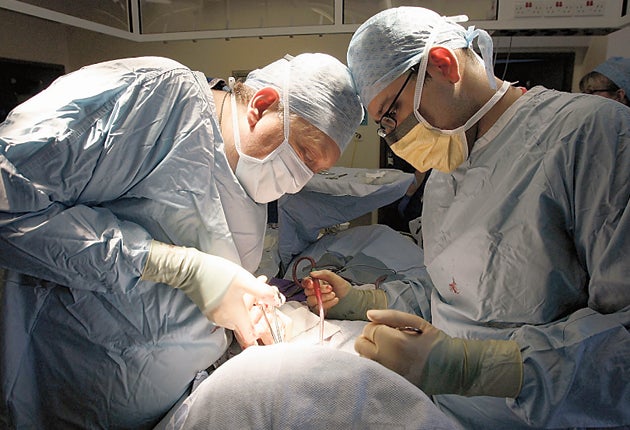Doctors to warn patients of transplant risks
As many as a quarter of all organs are rated as 'marginal'

Your support helps us to tell the story
From reproductive rights to climate change to Big Tech, The Independent is on the ground when the story is developing. Whether it's investigating the financials of Elon Musk's pro-Trump PAC or producing our latest documentary, 'The A Word', which shines a light on the American women fighting for reproductive rights, we know how important it is to parse out the facts from the messaging.
At such a critical moment in US history, we need reporters on the ground. Your donation allows us to keep sending journalists to speak to both sides of the story.
The Independent is trusted by Americans across the entire political spectrum. And unlike many other quality news outlets, we choose not to lock Americans out of our reporting and analysis with paywalls. We believe quality journalism should be available to everyone, paid for by those who can afford it.
Your support makes all the difference.Surgeons will be forced to tell transplant patients more about the condition of organs that could save their lives, after a catalogue of complaints about the quality of "higher-risk" organs used in many hospitals. Ministers plan to give potential organ recipients the right to ask for full details of their donors before consenting to go ahead with what could be life-saving transplants.
The review of rules governing the use of "marginal" organs comes amid growing concern about the quality of many hearts, lungs, livers and kidneys harvested from outside a "shrinking pool" of healthy donors. The use of marginal organs, which could be from older people, drug addicts or heavy smokers, has grown in recent years, as transplant centres have struggled to treat more patients without a corresponding increase in the number of healthy young donors available.
In 1998, 13 per cent of all donor organs were rated as marginal, but a decade later the figure had doubled to over one in four of almost 3,500 transplants carried out in the UK.
A number of high-profile cases have highlighted the problems faced by many patients who receive marginal organs. It emerged earlier this year that Lyndsey Scott, who died a few months after a double lung transplant, had received the organs from a donor who had smoked for 30 years. Her father, Allan Scott, said she would have refused the operation if she had known where the lungs had come from.
John Richardson died five days after receiving a heart which later turned out to have been from a smoker and cocaine-user who had committed suicide. An inquest also heard surgeons had had to repair a hole in the heart before transplant.
The Independent on Sunday understands that health ministers have ruled out any restrictions on the number of marginal organs that can be used. But they have insisted that potential donors must be given far more information before agreeing to receive a "higher-risk" organ.
"If you look at the declining number and quality of the organs available to transplant teams, it is impossible to argue that they should take less marginal organs," one senior Department of Health source said last night.
"But it is very worrying to hear people experiencing terrible complications after transplant, and then complaining that they were not given a full rundown of the risks involved. The least we can do is to ensure that they are given all the information they need to make an informed choice."
The proposal for organ "passports", providing information on the condition of the donor and the organ, goes further than the recommendations being finalised by a group of experts. The IoS has established that a working group including surgeons, patients' representatives and a lawyer – set up by NHS Blood and Transplant (NHSBT) – also supports more disclosure to patients.
But clinicians believe patients should be made aware earlier in the process of the varying quality of organs that might become available in the future. They argue that giving full details of the condition of donated hearts and lungs, which must be used within around four hours, could lead to delays during a critical period while patients make up their minds.
James Neuberger, the NHSBT's associate medical director, said: "All organs are associated with some risk and it's important that the clinical team tells every patient about this early in the process. The worry is that on the night an organ is being offered, they do not have the luxury of an hour to go through the implications."
Join our commenting forum
Join thought-provoking conversations, follow other Independent readers and see their replies
Comments